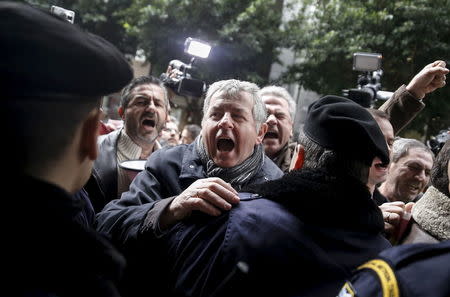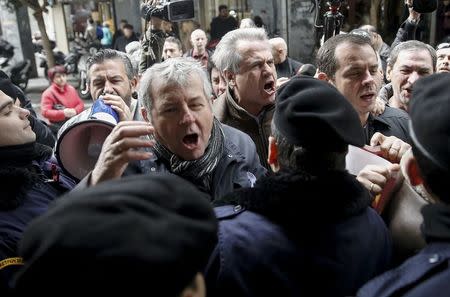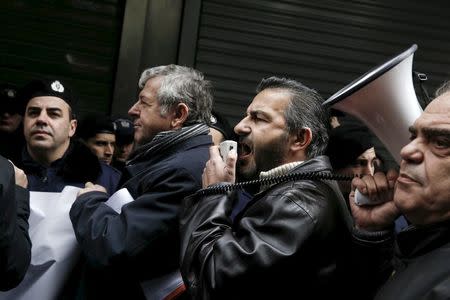Resentment simmers as Greece launches debate on pension reforms
By Lefteris Papadimas and Renee Maltezou ATHENS (Reuters) - Greek Prime Minister Alexis Tsipras launched a vocal defence of plans to overhaul the country's pensions system on Tuesday as public unrest simmered over cutbacks that are a condition for the indebted country to receive more international aid. Amid escalating protests, Tsipras said the country had no choice but to reform a system which had created chronic deficits and would collapse if left unchanged. He also challenged his main opposition rivals to come up with a better plan. "Present and future projections leave no room for complacency. To pay pensions in 2016, the social security system - apart from contributions and state funding - will need to find additional funds of 980 million euros," he said during a parliamentary debate, a preamble to a formal submission of the pension reforms bill expected in February. Tsipras, a leftist who swept to power a year ago, must keep lenders onside to complete an overdue review of reforms, without alienating his electorate altogether. Kyriakos Mitsotakis, newly-elected leader of the Conservative New Democracy Party, accused Tsipras of 'fooling' Greeks, referring to the prime minister's u-turn on his pre-election promises to end austerity. "In the space of a year, you turned hope into despair," said Mitsotakis in his first parliament speech as party leader. He is marginally leading Tsipras in opinion polls. Farmers who have been blocking motorways across the country sporadically for days in protest at plans to cut tax breaks for farming as well as pensions said they would escalate action and bring the country to a standstill unless Tsipras backed down. "We will step up action by blocking roads, ports and customs offices for more hours," said Vagelis Boutas, head of a national committee coordinating the farmer protests. Greece's pension system costs about 28.5 billion euros a year, and lenders want cutbacks equivalent to 1 percent of GDP per year. But Tsipras said that did not necessarily mean cutbacks in pensions, suggesting some flexibility in reforms. "There is always the ability to find measures with the same (fiscal) impact," he said. Mission chiefs from the European Commission, the European Central Bank, the euro zone rescue fund and the International Monetary Fund are due in Athens in coming days to start the bailout review. "ABOMINATION" Euro zone and IMF officials have said the planned reform is ambitious but the numbers do not add up. They oppose plugging the funding gap partly by raising employer and employee contributions, as Tsipras proposes, arguing that would harm economic recovery and discourage legal employment. Without pension reform, Athens cannot conclude the first review of its compliance to terms of a bailout worth up to 86 billion euros agreed last August, and move on with talks on potential debt relief, which Tsipras sees as a vital prize. But that cuts little ice with millions of people, farmers included, who will see contributions jump to about 20 percent of earnings to prop up the new pension system. "We are taking a 20 percent cut in earnings, and this will force us to work 15 to 17 years more to get a pension which will be cut by about 25 to 30 percent," said Michalis Yiannakos, 55, a nurse. "We will fight until the prime minister withdraws this abomination," he told Reuters. Government officials say formal parliamentary deliberation on the pension reform bill is expected in February. That will test both the cohesion of Tsipras' radical coalition and the reform credentials of Mitsotakis, scion of a powerful Greek political family and son of a former prime minister. Approval of the bill, likely to come to a vote early next month according to government officials, is far from certain, with wavering leftist lawmakers from farming regions threatening to cancel out Tsipras's three-seat majority. (Writing by Michele Kambas; Editing by Paul Taylor and Ralph Boulton)

 Yahoo News
Yahoo News 


